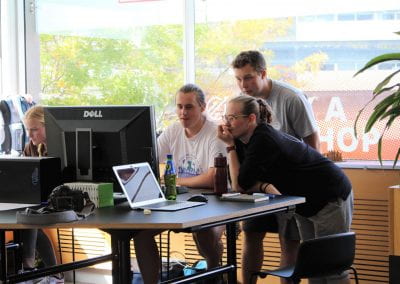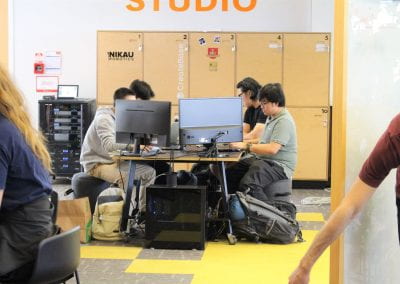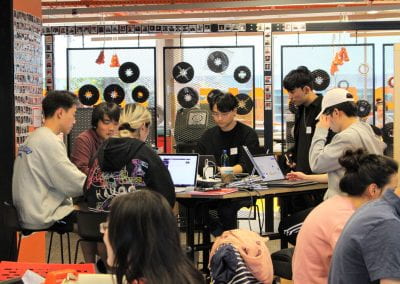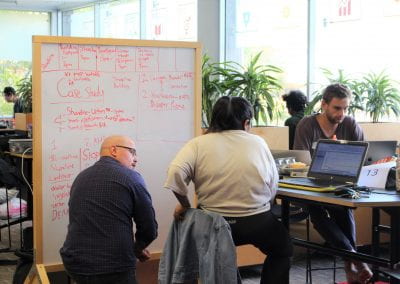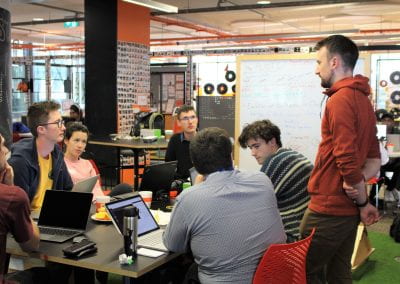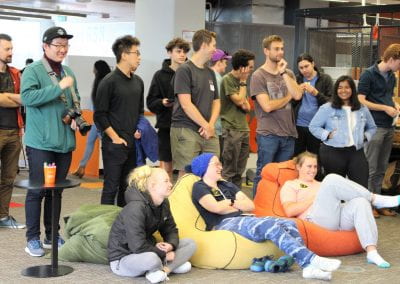
NEWSROOM
Students use satellite imagery to hack New Zealand’s challenges
19 May 2021
230 students from universities across New Zealand formed 68 teams to compete in TakiWaehere, the New Zealand Geospatial Hackathon powered by the Ministry of Business, Innovation and Employment (MBIE) and Maxar Technologies, a global space and data analytics company that owns and operates the world’s most sophisticated constellation of Earth imaging satellites. The Auckland venue for TakiWaehere was Unleash Space, the University of Auckland’s vibrant innovation and entrepreneurship hub, run by the Business School’s Centre for Innovation and Entrepreneurship.
The 24-hour hackathon held on 17-18 April challenged participants to use satellite imagery to solve real life challenges faced in New Zealand. Teams developed innovative solutions that can be scaled and applied on a regional or national level, received free training and mentoring from expert coaches, and competed for a prize pool worth over $200,000. Each winning team received a cash prize, a subscription to Maxar’s satellite image library, and the picture of a lifetime – an image of their group taken from a satellite.
Each team chose a challenge theme to tackle such as understanding Covid-19 and preparing for the future, planning for a changing coastline, urban landscapes, and wildlife populations. They then created and presented a working prototype that solves their chosen challenge. Teams were judged on creativity, how they leveraged data and resources, their solution, and competitive advantage.
The winning team was a group of students from Auckland who chose to tackle the theme of “Managing Emergencies.” They paired satellite imagery with New Zealand areas that are prone to flooding to map critical infrastructure and identify potential points of failure.
Hackathon organiser and University of Auckland Science student Zac Miller-Waugh says, “Unleash Space was perfect for this event as it facilitates a wonderful collaborative working environment. My highlights were every chance I had to really sit down with a team and talk through their ideas. We had some fantastic students participating, and getting to know some of them was an absolute pleasure.”
Approximately 60 students from 16 teams worked out of Unleash Space over the course of the weekend. For some, it was their first time participating in an intensive hackathon style event. Zac says, “Hackathons are the perfect opportunity for students to apply their knowledge to real-world problems in creative ways. You’ll learn a bunch, make new friends, meet new people, and sometimes even come out with new career options!”
Earlier this year, MBIE signed a memorandum of understanding with Maxar Technologies, and TakiWaehere was their first project. Dr. Peter Crabtree, General Manager of Science, Innovation, and International at MBIE says, “TakiWaehere is a great example of what our partnerships with international companies can achieve, helping to address the big challenges we face as a country. It gave students the opportunity to showcase their innovative solutions to today’s real-world problems, and could be their opportunity to progress their ideas into reality and make a real impact. MBIE will work with the teams with the best ideas to link them up with domestic geospatial and other data firms to potentially progress their prototypes into real solutions.”
Director of the Centre for Innovation and Entrepreneurship Darsel Keane says “It was wonderful to be involved in the TakiWaehere hackathon. The space industry can seem like such a far out concept, but it is valued at over $650 billion globally and with New Zealand’s geographically isolated position perfect for space traffic, and kiwi ingenuity there is such a great opportunity to lead in this area. We welcome opportunities such as TakiWaehere to help enable the potential of our students, connect them with industry leaders, and prepare them for the jobs of tomorrow.”
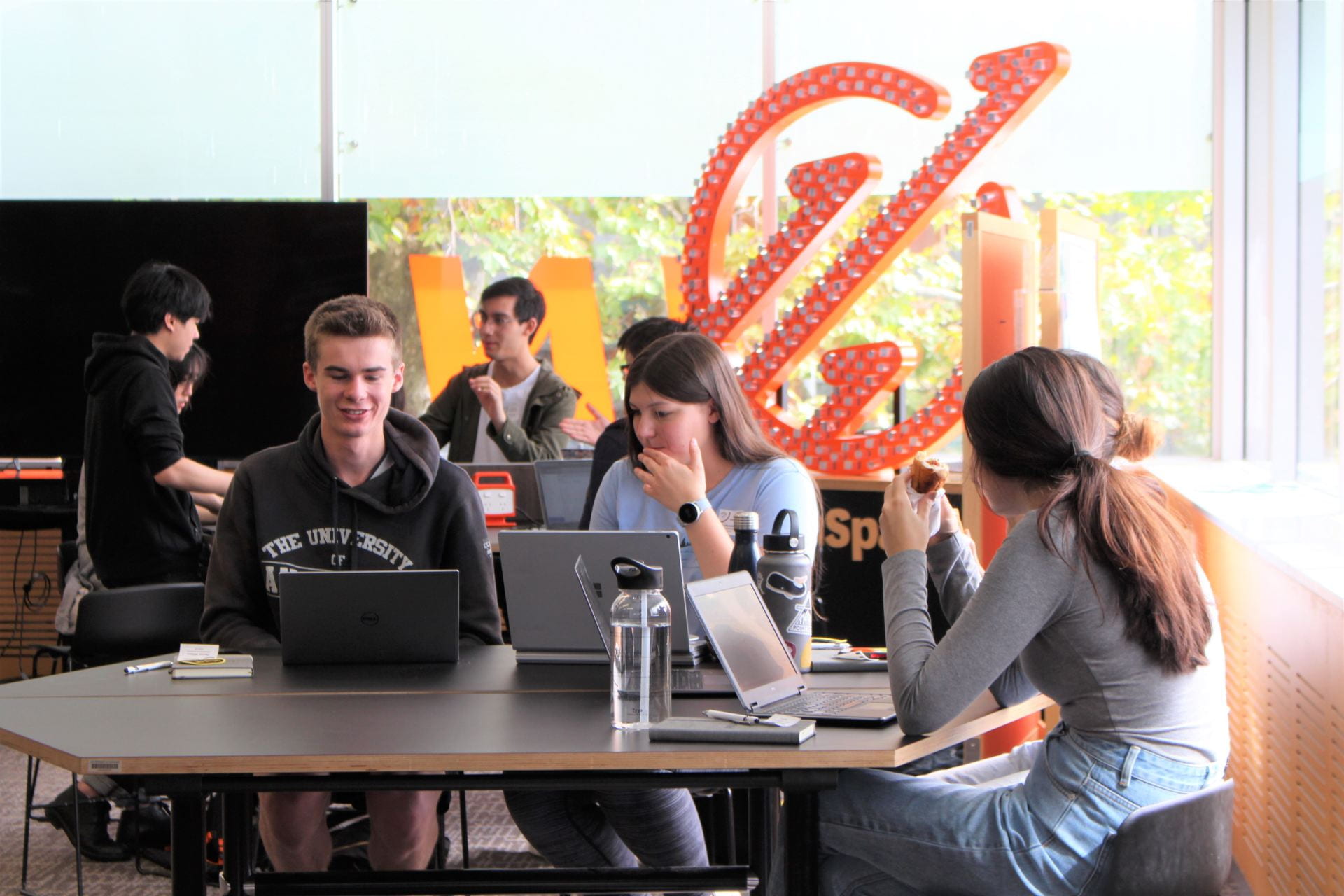

19 May 2021
230 students from universities across New Zealand formed 68 teams to compete in TakiWaehere, the New Zealand Geospatial Hackathon powered by the Ministry of Business, Innovation and Employment (MBIE) and Maxar Technologies, a global space and data analytics company that owns and operates the world’s most sophisticated constellation of Earth imaging satellites. The Auckland venue for TakiWaehere was Unleash Space, the University of Auckland’s vibrant innovation and entrepreneurship hub, run by the Business School’s Centre for Innovation and Entrepreneurship.
The 24-hour hackathon held on 17-18 April challenged participants to use satellite imagery to solve real life challenges faced in New Zealand. Teams developed innovative solutions that can be scaled and applied on a regional or national level, received free training and mentoring from expert coaches, and competed for a prize pool worth over $200,000. Each winning team received a cash prize, a subscription to Maxar’s satellite image library, and the picture of a lifetime – an image of their group taken from a satellite.
Each team chose a challenge theme to tackle such as understanding Covid-19 and preparing for the future, planning for a changing coastline, urban landscapes, and wildlife populations. They then created and presented a working prototype that solves their chosen challenge. Teams were judged on creativity, how they leveraged data and resources, their solution, and competitive advantage.
The winning team was a group of students from Auckland who chose to tackle the theme of “Managing Emergencies.” They paired satellite imagery with New Zealand areas that are prone to flooding to map critical infrastructure and identify potential points of failure.
Hackathon organiser and University of Auckland Science student Zac Miller-Waugh says, “Unleash Space was perfect for this event as it facilitates a wonderful collaborative working environment. My highlights were every chance I had to really sit down with a team and talk through their ideas. We had some fantastic students participating, and getting to know some of them was an absolute pleasure.”
Approximately 60 students from 16 teams worked out of Unleash Space over the course of the weekend. For some, it was their first time participating in an intensive hackathon style event. Zac says, “Hackathons are the perfect opportunity for students to apply their knowledge to real-world problems in creative ways. You’ll learn a bunch, make new friends, meet new people, and sometimes even come out with new career options!”
Earlier this year, MBIE signed a memorandum of understanding with Maxar Technologies, and TakiWaehere was their first project. Dr. Peter Crabtree, General Manager of Science, Innovation, and International at MBIE says, “TakiWaehere is a great example of what our partnerships with international companies can achieve, helping to address the big challenges we face as a country. It gave students the opportunity to showcase their innovative solutions to today’s real-world problems, and could be their opportunity to progress their ideas into reality and make a real impact. MBIE will work with the teams with the best ideas to link them up with domestic geospatial and other data firms to potentially progress their prototypes into real solutions.”
Director of the Centre for Innovation and Entrepreneurship Darsel Keane says “It was wonderful to be involved in the TakiWaehere hackathon. The space industry can seem like such a far out concept, but it is valued at over $650 billion globally and with New Zealand’s geographically isolated position perfect for space traffic, and kiwi ingenuity there is such a great opportunity to lead in this area. We welcome opportunities such as TakiWaehere to help enable the potential of our students, connect them with industry leaders, and prepare them for the jobs of tomorrow.”
EMAIL
CIE@AUCKLAND.AC.NZ
POSTAL ADDRESS
THE UNIVERSITY OF AUCKLAND BUSINESS SCHOOL
PRIVATE BAG 92019, AUCKLAND






